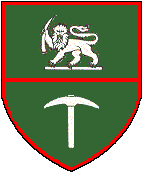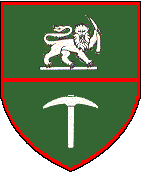Army Home Page Site Home Page Contact Us
When David Heppenstall sent me a surprise request to write 'something' about Rhodesian and Portuguese Cooperation in Mozambique in the early days I was presented with the problem of having to relate all I know purely from memory - bearing in mind that the 'early days' refers (I think) to the period 1968-72, the reader will forgive any lapses of memory concerning factual incidents or dates as my feeble mind attempts to bridge a gap of over 20 years.
On a sunny day way back in 1968 as a young sergeant in the Rhodesia Army Pay Corps, I was ordered to attend a briefing at 1 RLI Ops Room where I was told that because of my knowledge of Portuguese (I was born in Beira), I was to serve as
interpreter to a tracking team that was to undertake a clandestine
mission to the Tete Province of Mozambique. Prominent among those
attending the briefing were such redoubtable warriors as (then) Major
Rob Southey and Capt Ron Reid-Daly. It transpired that 'Uncle' Ron had
been on one of these jaunts previously and he enthusiastically
described what an exciting little war Portuguese troops were waging
against Frelimo in the section of the Tete Province north of the
Zambesi. Our task was to operate with Portuguese troops against Frelimo
and Coremo insurgents who were subverting the Province. Basically our
trackers, supported by Portuguese troops would follow and find the
enemy and, if he could be brought to bay, a firefight would ensue - as
an exercise in cooperation the whole idea worked very well with mutual
benefit for both sides (at least for all the time I was involved). Our
troops gained extra battle/firefight experience (I served on many trips
with either RLI or SAS tracking teams) and the Portuguese learnt
something about the importance of bushcraft/ tracking to the extent
that Portuguese soldiers attended training courses at tracking wing in
Kariba.
For me this was a most interesting 4
year period in my life - imagine - here was I a 'fountain pen crook'
liable to be called out at any time to go on another 'mission
impossible', my mind boggled! I quickly discovered a great diversity of
opinion amongst our troops concerning our allies; being half Rhodesian
and half Portuguese I was, perhaps, about to be un-partisan in my
personal opinion. It seemed to me that most of our officers outwardly
respected Portuguese methods and both sides appeared to understand one
another militarily; and on a personal basis I was able to witness the
start of many genuine friendships - this latter aspect was not
surprising given the legendary Portuguese reputation for hospitality,
courtesy and warm hearted generosity. Among the Rhodesian other ranks
there appeared to be a lack of understanding as to the background of
our allies - I remember an SAS NCO recalling (triumphantly) how a
certain Major Forbes had routed a Portuguese Force at the battle of
Maziquece in the 1890's...
"But," I said to him quoting Alan
Villiers the distinguished modern sailor, "the Portuguese are an
astonishing people - at the time of her glorious great voyages the
entire population of Portugal totalled only a million and a half yet
they were. first around Africa (Dias 1488); first to India (Vasco da
Gama 1498); first to Brasil (Cabral 1500); first across the Pacific
(Magalhaes 1520); first upon the banks of Newfoundland. In two of the
worlds three great oceans the commanders of the first western ships
were Portuguese - they were the first by sea to China and Japan. An
incredible record! And, in case you've forgotten your school history
the great Francisco Barreto led a Portuguese army into present day
Rhodesia ... the Portuguese have a saying: 'We discovered the whole
world. It is a pity God did not make more of it for we would have
discovered that too!'
Unimpressed, he asked, "Why
then are
they now such an obscure people?"
It is easier to explain the end of the
British Empire or indeed the end of the Rhodesian Nation than to answer
that one. Perhaps Portugal's small population over extended and
exhausted itself trying to hold on to their far flung possessions and
wealthy trade ... certainly in the Mozambique of the late 1960's and
early 70's there were about 55000 Portuguese troops and militia more
than a third in the Tete Region. This figure included a large
proportion of locally recruited African troops notably amongst them the
highly effective Flechas (Arrows). Tete received a very high military
priority (because Cabora Bassa Dam was in process of construction and a
good enemy target) though the Cabo Delgado District of Northern
Mozambique was militarily far 'hotter'.
The main criticisms emanating from
Rhodesian troops was that vast areas of Tete were only lightly
patrolled - this criticism was justified but needs some explaining.
Tete was a large province impossible to patrol effectively with
available resources and, as we Rhodesians were to discover ourselves
later in our own country, it is impossible to be 'everywhere at the
same time'. Also many Rhodesians for some reason expected Portuguese
troops from metropolitan Portugal to possess the same degree of
personal motivation and commitment to Mozambique, a country many
thousands of miles from Portugal, as they had for Rhodesia. On my trips
I spoke with many young officers, NCO's and soldiers (mostly conscripts
from Portugal) - I found that many resented being taken away from their
families/studies/careers and, finding themselves suddenly spending 2
years in an alien and hostile African environment refused to believe
they were defending their own country - this attitude was identical to
that of young Americans being conscripted to serve in Vietnam. One NCO
from a commando unit told me, "I will fight for my men and my unit -
but the country means little to us from Portugal".
Portuguese troops, for those Rhodesians
who can remember serving with them, were mostly tough, competent men in
regulation camouflage and armed with G3s (a remarkably reliable
Portuguese made self loading rifle of German design with a 7.62
calibre). Subalterns and conscripts were young men in their early 20's.
Tete was a free fire zone as all (or
most) of the population was removed to 'aldeamentos" (protected
villages) - I think this was a French idea and it was a good one as it
meant that any movement in the bush should bring in a patrol to
investigate (in Rhodesia we emulated this idea fairly successfully).
Patrolling with Portuguese troops was
very interesting - I always felt I was in good company. Most cacadores
(troopers) walked along with G3 across the shoulder held by the barrel.
The attitude was one of casual alertness; by contrast Rhodesian
trackers, in a more vulnerable position up front, always held G3 at the
ready. When contact was made with the enemy the cacadores would, as if
all of one mind, immediately charge forward with a total disregard for
cover of any sort and uncaring of what type of opposition was ahead.
Many of them, full of battle passion, would call out exultantly to the
enemy to wait for them, others would mouth obscenities; I once saw Cpl
Dennis Croukamp BCR heading a charge of a dozen or so cacadores up a
kopje from whence the enemy had poured down AK fire. When he finally
rejoined us he was in an exhilarated mood ... on another memorable
occasion having discovered an abandoned Frelimo base camp we were busy
clearing an LZ for our new borne reinforcements when the enemy,
returning, finding us so few and vulnerable opened fire from a ridge
some 150 yards away where upon the cacador working with me hacking down
a young mopani, almost by instinct immediately charged up the ridge
armed with nothing more than my machete and raw courage. By the time I
and the rest of the liaison team had joined him on the crest of the
ridge with our FNs and grenades the enemy had fled. To this day one of
the most memorable visions my mind's eye can recall is of this irate
machete waving cacador shouting obscentities at the departed enemy.
As I write memories crowd in
... the worse experience one could undergo in Mozambique was travelling
in convoy on the dirt roads, always infested with land mines, progress
was at snails pace literally - 4 or 5 men would de-bus with steel
tipped sticks named "picas" (after the bull fighting lances) to probe
for mines, the men behind always careful to step onto the footprinting
of those ahead. The success rate at mine detecting was always very
high. There was always some incident to relieve the monotony - once,
when I was sitting aboard one of the lead sand bagged Berliets watching
a picada team and half dozing in the oppressive sweltering heat someone
shouted "Al o turra!" (there's a ter!) and sure enough some 200 yards
ahead, bold as brass, an armed African dressed in black crossed the
road. The gunner on my vehicle immediately levelled his machine gun and
was about to let rip when cried of "Alto! Alto! E nosso!", made him
ease up (Hold it! He's one of ours). Then cries of "Nao! Nao! E turra!
turra!" (No! It is a ter!). By now the ter was racing for the trees and
was into them when the whole convoy opened up on him - even the
civilian drivers! It was his lucky day! Man for man these soldiers were
the moral equal of troops anywhere. However, many of them, being from a
temperate climate lacked the stamina of the Rhodesians; also, I felt,
their diet was unbalanced for though well fed they were mostly
undernourished and it showed on patrol. Once, out for 8 days with 2Lt
Bob Warraker, our cacador escort was twice replaced with fatigue, with
no such luxury for the trackers who had been cross graining the terrain
for days with nothing to show for our troubles but tongues swollen with
thirst. Our water had run out the previous day. For some reason I was
carrying the radio and by now it felt like a ton. My legs had that
familiar wobble and shakiness that comes with exhaustion and
dehydration. When Warraker called a halt in the twilight I remember
passing him the hand set as I bent to one knee while he gave the
sit-rep in a voice rasping with dryness and which included one of the
most understated lines I've ever heard "... water could become a
problem ...", very matter of fact. Some minutes after this a cacador in
our section opened his last rat pack from which he removed the tin of
pineapple juice. It was the only drink he had left, yet in a gesture of
totally unselfish generosity, he hauled off the pull ring and offered
it to me and, to my dying shame I accepted, took a gulp and handed it
back (though this took some will power on my part!). By great good
fortune God sent down a deluge in the early hours of the morning and
Andre Rabie and I collected water in his ground sheet and the rest of
the night was spent making endless mugs of tea on my gas burner in a
vain effort to shake our unquenchable thirst. Daylight found us still
smoking soggy Texan cigarettes as we stood in the morning drizzle with
our stomachs swollen with all the liquid imbibed...


